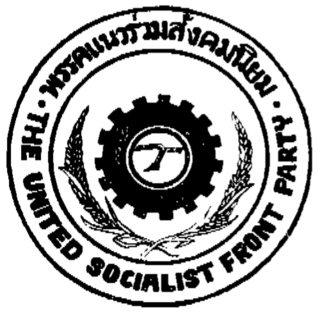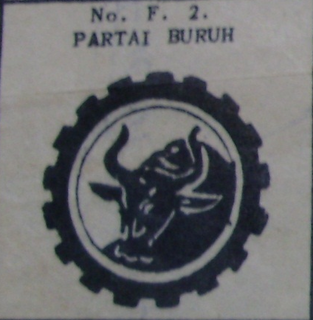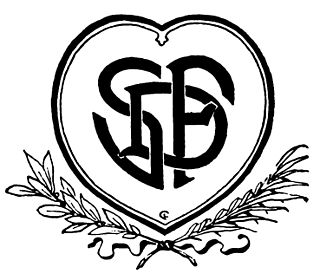Related Research Articles
A political international is a transnational organization of political parties having similar ideology or political orientation. The international works together on points of agreement to co-ordinate activity.

The Burma Workers Party, until 1958 the Burma Workers and Peasants Party, was a communist party in Burma, formed on 8 December 1950 by leftist elements of the Socialist Party. In December 1962 it merged with the People's Comrade Party to form the United Workers Party. In March 1964, it was among the many parties banned by decree of the Revolutionary Council.

The Labour Party of Malaya was a political party in Malaya that was active between 1952 and 1969. It was originally formed as a confederation of state based labour parties known as the Pan-Malayan Labour Party (PMLP).
The Sangkum Reastr Niyum, lit. 'Populist Community'; French: Communauté socialiste populaire), usually translated as Popular (or People's) Socialist Community and commonly known simply as the Sangkum, was a political organisation set up on 22 March 1955 by Prince Norodom Sihanouk of Cambodia. Though it described itself as a 'movement' rather than a political party, the Sangkum retained control of the government of Cambodia throughout the first administration of Sihanouk, from 1955 to 1970. Central to the Sangkum ideology were nationalism, conservatism, preserving the monarchy, and a conservative interpretation of Buddhism.
The Burma Socialist Party, initially known as the People's Freedom (Socialist) Party or PF(S)P, was a political party in Burma. It was the dominant party in Burmese politics after 1948, and the dominant political force inside the Anti-Fascist People's Freedom League.
The Asian Socialist Conference (ASC) was an organisation of socialist political parties in Asia that existed between 1953 and 1965. It was established in an effort to build an Pan-Asian multinational socialist organization, clearly independent from earlier European colonial centers, yet free from the new superpowers of the Cold War. Until 1963 its headquarters was in Rangoon, Burma; the first chairman and treasurer of the conference were the Burmese socialist leaders Ba Swe and Kyaw Nyein respectively. As of 1956, the member parties of ASC had a combined membership of about 500,000. In total, four Asian Socialist Conferences convened: Rangoon, 1953 and 1954, and Bombay, 1956 and 1965.
The Pakistan Socialist Party was a political party in Pakistan. It was formed out of the branches of the Indian Socialist Party in the areas ceded to the new state of Pakistan. The PSP failed to make any political breakthrough in Pakistani politics. Being a secular socialist party, which had strongly opposed the creation of the state Pakistan, the PSP found itself politically isolated and with little mass appeal. The party was labelled as traitors and kafirs by its opponents. The PSP found it difficult to compete with the Islamic socialism that Liaquat Ali Khan professed to in 1949.
The Trade Union Congress (Burma) was a central trade union organization in Burma. The TUC(B) was founded by the Socialist Party in November 1945, in an attempt to counter the influence of the communist-led All Burma Trade Union Congress. Ba Cho was the President of TUC(B). The TUC(B) was an affiliate of the governing Anti-Fascist People's Freedom League.

The National United Front was a political alliance in Burma.

The Socialist Front was a political coalition in Thailand, formed by leftwing parties in late 1956. The main group in the coalition was the Economist Party, led by Thep Chotinuchit. The other two constituents of the Socialist Front were the Free Democratic Party and the Hyde Park Movement Party. Thep Chotinuch was the chairman of the Socialist Front. The parliamentarians who founded the Socialist Front came from northeast Thailand. The Socialist Front favoured a neutralist foreign policy, and called for Thai withdrawal from SEATO.
The Socialist Party of Indonesia was a political party in Indonesia. It was founded at a meeting in Jogjakarta on 13 November 1945. The Defence Minister Amir Sjarifuddin was the chairman of the party. Parsi was largely made up by Amir Sjarifuddin's former colleagues from the wartime resistance struggle in East Java. Some of them originated in Gerindo, a leftwing, nationalist and pro-Sukarno group active before the war. There were also some persons, like Abdulmadjid, Moewaladi and Tamzil, who had lived in the Netherlands during the war, and taken part in the anti-fascist resistance struggle there. The primary objective of Parsi was the independence of Indonesia from colonial rule, which was to be followed by the construction of a socialist society.
The Socialist People's Party was a political party in Indonesia. It was founded in Djakarta in 1945. Sutan Sjahrir was the chairman of the party. In December 1945, at a meeting in Cheribon, the party merged with the Socialist Party of Indonesia, forming the Socialist Party with Sjahrir as chairman.
The Socialist Party was a political party in Indonesia. It was founded in December 1945 at a meeting in Cheribon, as the Socialist People's Party (Paras) of Prime Minister Sutan Sjahrir and the Socialist Party of Indonesia (Parsi) of Defence Minister Sjarifuddin merged. Sjahrir became chairman of the unified party, whilst Sjarifuddin became vice-chairman.
The Labour Party of Indonesia was a political party in Indonesia.

The Labour Party was a political party in Indonesia. It was formed on December 25, 1949 by a group of former Labour Party of Indonesia (PBI) members, who had disagreed with the merger of PBI into the Communist Party of Indonesia.
The influences of socialism and socialist movements in Pakistan have taken many different forms as a counterpart to political conservatism, from the groups like The Struggle, Lal Salam which is the Pakistani section of the International Marxist Tendency, to the Stalinist group like Communist Party through to the reformist electoral project enshrined in the birth of the Pakistan Peoples Party (PPP)
The Viet Nam Democratic Socialist Party was a political party in South Vietnam.
Socialist Weekly was an Urdu language newspaper published from Karachi, Pakistan. Socialist Weekly was launched in late 1947 as a continuation of the Sindhi Socialist Weekly. Socialist Weekly carried the symbol of the Indian Socialist Party in its masthead. It became the official organ of the Pakistan Socialist Party when the party was constituted in January 1948. The original editorial board consisted of Mobarak Sagher, Munshi Ahmad Din, Siddique Lodhi, Ram Mohan Sinha, Kali Charan and Mohammed Yusuf Khan. Socialist Weekly had a circulation of around 2,500.

The Social Democratic Federation (SDF) was established as Britain's first organised socialist political party by H. M. Hyndman, and had its first meeting on 7 June 1881. Those joining the SDF included William Morris, George Lansbury, James Connolly and Eleanor Marx. However, Friedrich Engels, Karl Marx's long-term collaborator, refused to support Hyndman's venture. Many of its early leading members had previously been active in the Manhood Suffrage League.

Kyaw Nyein, called honorifically U Kyaw Nyein, was a Burmese lawyer and anti-colonial revolutionary, a leader in Burma’s struggle for independence and prominent politician in the first decade after the country gained sovereignty from Britain. He held multiple minister portfolios in the government of Prime Minister U Nu, served as General Secretary of the ruling political alliance, Anti-Fascist People's Freedom League (AFPFL), and was joint General Secretary of the Burma Socialist Party (BSP).
References
- 1 2 3 Rose, Saul. Socialism in Southern Asia. London: Oxford University Press, 1959. p. 181
- 1 2 3 Trager, Frank N (ed.). Marxism in Southeast Asia; A Study of Four Countries . Stanford, Calif: Stanford University Press, 1959. p. 97
- ↑ Pickerell, Albert and Daniel E. Moore. Elections in Thailand (II) , in Far Eastern Survey, Vol. 26, No. 7 (Jul., 1957), pp. 103-111
- 1 2 Wilson, David A.. China, Thailand and the Spirit of Bandung (Part II) , in The China Quarterly, No. 31 (Jul. - Sep., 1967), pp. 96-127
- ↑ Ockey, James. Through Multiple Transitions in Thailand. Variations on a Theme: Societal Cleavages and Party Orientations , in Party Politics 2005; 11; 728
- ↑ "HKU Scholars Hub: HKU Theses Online" (PDF).
- ↑ "The Age - Google News Archive Search".
- ↑ Rose, Saul. Socialism in Southern Asia. London: Oxford University Press, 1959. p. 183